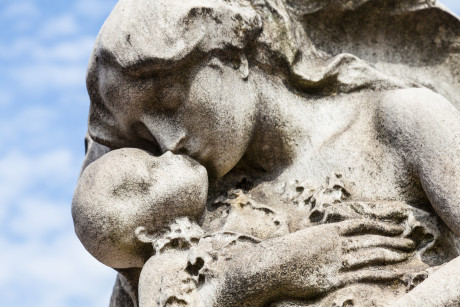
A couple of weeks ago, my 20-year-old cousin put his father’s service revolver to his head and pulled the trigger. His parents and one of his brothers were home at the time. They heard the shot and ran to his room. His mother and brother tried to stop the bleeding while his father performed CPR. Someone called 911. The ambulance came.
Miraculously, my cousin is still alive. The bullet didn’t take a fatal path, though its full effects aren’t yet known. The doctors initially said not to talk to the patient, to let his brain rest. His parents and siblings sat quietly at his bedside those first days, lulled by exhaustion and the hum, beep, and hiss of hospital monitors, allowed only to stroke his hand and pray.
Recently, several LWONers have posted touching essays about new babies and the deep well of anxious delight that one dives into as a parent. My apologies for the drastic change of mood, but the idea of seeing your own child die—even though my cousin is, thankfully, likely to survive—has been forced into my mind.
I am not a parent. But I wonder how can a parent, particularly a mother—as steeped as she is in pure love for this child—begin to process such loss? What does her life become after the unthinkable happens? (I am not dismissing fathers’ suffering, which can be just as great. I just have mothers on my mind.)
There are a lot of concepts and questions that the language of science can handle well. This most excruciating sadness seems to me untouchable.
Loss does attack us in tangible ways. Grief can exacerbate physical pain and, not surprisingly, lead to all levels of depression. Over time it can disrupt vital sleep patterns (especially in the elderly, helping to explain why spouses often die in rapid succession). A grieving parent may suffer a mental disorder such as PTSD, especially if a child dies violently. There are reports of grief-related inflammatory response, changes in blood pressure and heart rate, and lowered infection-fighting T-cell counts in mourning moms and dads. If grief can make us sick, it would follow that we can literally die from a broken heart.
As we are human, we dissect our feelings about death and loss in search of clarity. We collect data and look for trends: Research suggests that non-violent death is less devastating to a parent than a violent one and that the child’s sex and age can affect the grieving process. We look for solutions: Finding meaning in a child’s death (often through religion) helps some people. Channeling one’s sadness toward something positive helps others. We compare cases and define normalcy: There is a “normal” grieving period and, for unending sadness, there is ‘complicated’ grief—another soft term for the hardest thing in the world. [See this LWON piece on diagnosing grief and the links within.]
 Sitting here waiting for news, I keep picturing this young man—still a child, really, literally rosy cheeked and baby faced—so distraught about something that’s a mystery to the rest of us that he wants nothing more of life. His action goes against the natural order of childhood so fiercely, and I imagine his mother’s anguish as beyond what a human is meant to endure. Our language, our scientific minds, can only take us so far down this grueling path.
Sitting here waiting for news, I keep picturing this young man—still a child, really, literally rosy cheeked and baby faced—so distraught about something that’s a mystery to the rest of us that he wants nothing more of life. His action goes against the natural order of childhood so fiercely, and I imagine his mother’s anguish as beyond what a human is meant to endure. Our language, our scientific minds, can only take us so far down this grueling path.
Still, scientists have described the anatomy of grief. Consider a University of Michigan study in 2011 that concludes there is physiological truth to the term “broken heart.” (They were looking at loss of love rather than loss of a loved one, but the findings are relevant.) The study refers to an intense agony that hurts “even more than pain” (how limited our vocabulary on these matters!) and is marked by electric and chemical changes in the brain—in the secondary somatosensory cortex and dorsal posterior insula, to be specific—that parallel those that happen during a physically painful experience.
The hurt, described by the Mayo Clinic as broken-heart syndrome, really does emanate from that most vital of organs. Studies have found that stress hormones released after a loved-one’s death can actually disrupt the heart’s normal pumping function while the rest of the heart continues to work normally or, sometimes, more forcefully—resulting in symptoms that are indeed reminiscent of a heart attack. Other researchers suggest it’s an overstimulation of the vagus nerve that produces the chest pain and other heart-attack-like symptoms some parents suffer.
A mother can never really know the why, can she? She can scrutinize the social strains her son was under, pore over what he hated about himself; she might consider (hope for?) an undiagnosed mental illness. She must blame herself, over and over. She may pretend meaning exists in his death and she might take comfort in others who share her experience. She may turn her grief into a book, a talk, a foundation, as a way to feel she’s heading somewhere with her son, in name at least, beside her. She may fold her sadness around herself as a barrier to any emotional experience, happy or tragic, that comes next.
Whatever she does to cope, or not, with this sadness, her new reality has no logic, no fairness, and no norm. I am not a mother. But there is a mother within me—perhaps in every woman—who can glimpse for an agonizing moment what that sadness must be like. Nothing is sufficient to explain it: I’m almost embarrassed to have given it scientific description above. A mother’s heart must shatter. There is little else to say.
—-
Photos from Shutterstock
Jenny,
Thanks for putting a voice to this. Two years ago, a close friend of mine put a gun to her head and did not survive. She left behind a ten year old son, husband, twin sister, mother, and group of friends who watched her fall through their fingers. I’ve watched her mother struggle to grasp not only the loss, but to understand her illness and the events that led to it. For my part, the violence of her death has haunted me, and reconciling that horror with the amazing life force she emanated as a healthy woman has been very difficult. I appreciate you talking about the science of grief, especially around suicide, or the attempt thereof. For people like me, the science actually helps make some sense of a hard to understand situation, and allows me to move on to the emotional healing that needs to happen. I agree that there is a mother in all women, regardless of what they choose to give birth to in the world. Your compassion is deeply appreciated. Thanks for giving much needed exposure to this issue, and I hope the best for your cousin.
Niki, thanks so much for sharing that–and for the kind comments about the piece. My heart goes out to you and your friend’s family…so tragic. I’m glad that I was able to offer a bit of information that was useful. Interesting that for some of us understanding the science is a actually cathartic!